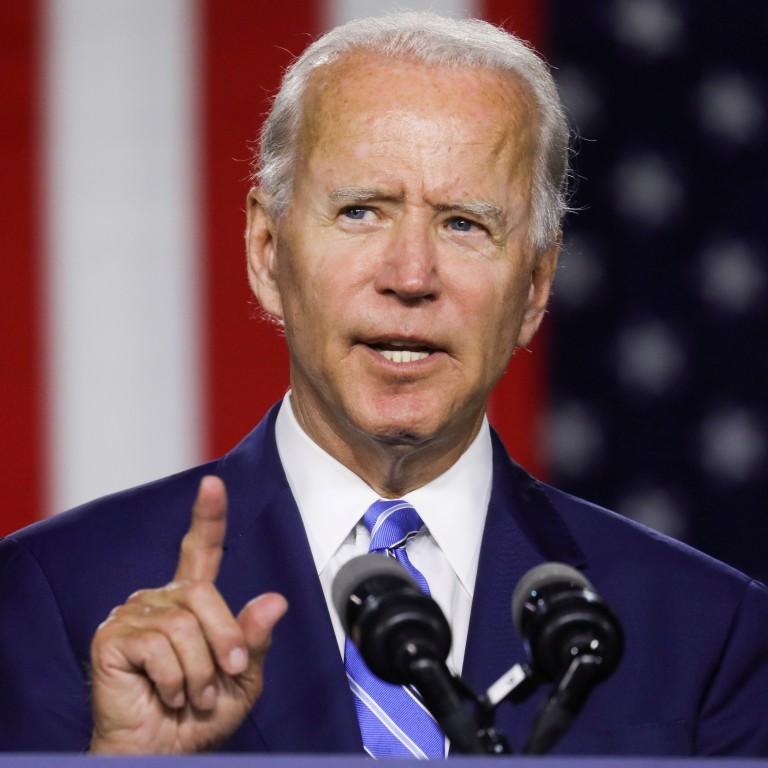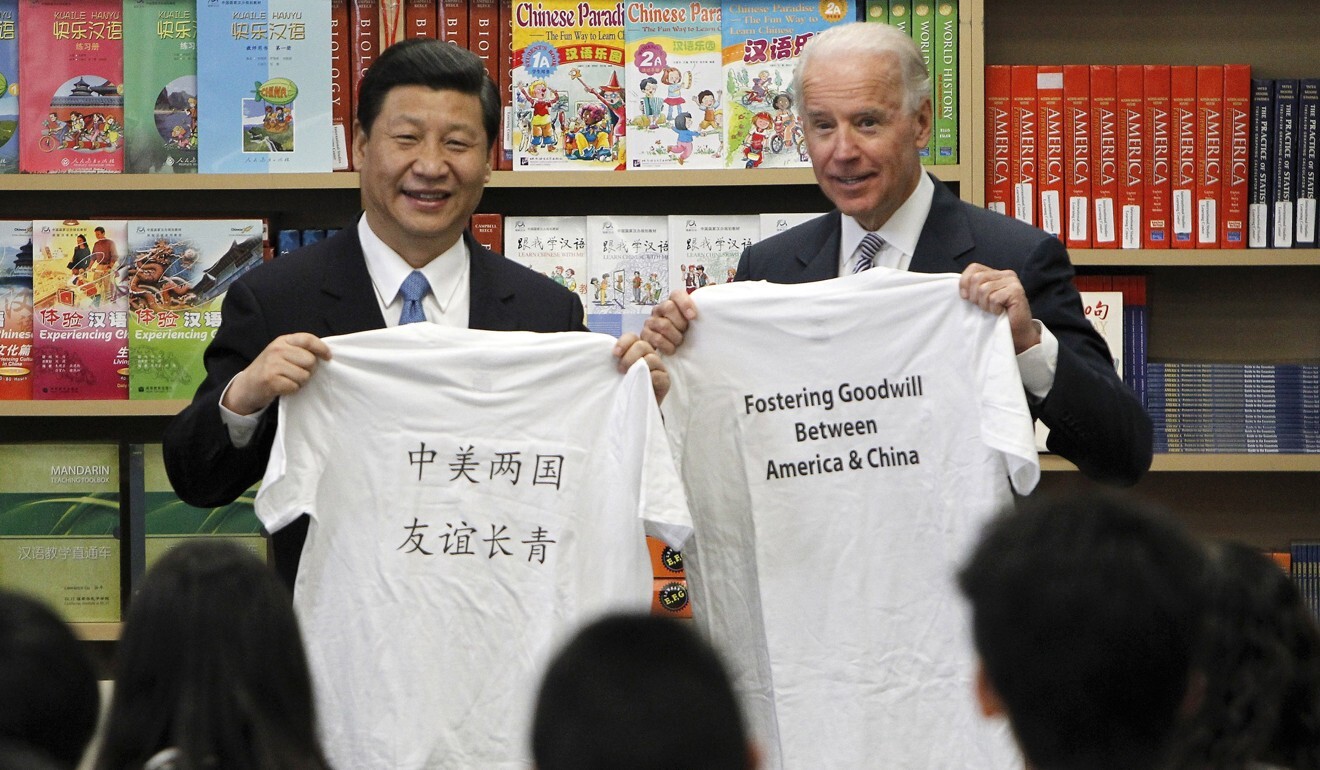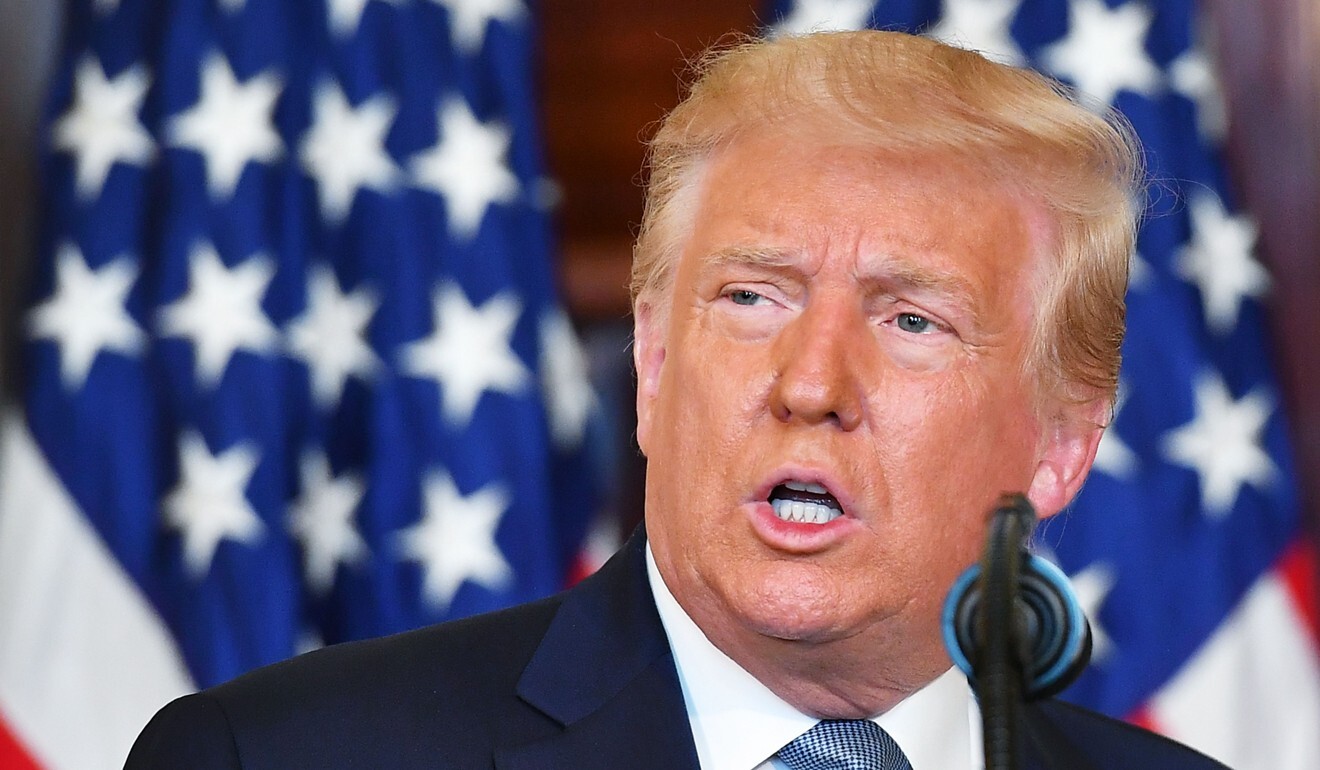
Biden’s Democrats talk tough on China, but see different measures than Trump
- Democratic Party platform echoes some of Donald Trump’s rhetoric on China, but criticises his tariff war and calls for ‘united front’ with allies
- The platform, which maps out Joe Biden’s actions should he win the presidency, suggests a continued hard line on Hong Kong autonomy and Uygurs
The coming US elections – now just 11 weeks away – might show an America more divided than ever on issues like social justice and the country’s economic prospects. But when it comes to China, the Democratic Party’s platform will not pave the way to a reduction in bilateral frictions.
The 90-page Democratic Party platform, to be approved by delegates to the party’s national convention this week, contains passages that echo some of the rhetoric that has defined the attacks on China made by US President Donald Trump’s administration – but also insists that the trade war Trump started with China more than two years ago has weakened America economically.
The Democratic platform, crafted as a statement of the agenda of the party and its presidential nominee, Joe Biden, “lambasts the Trump administration's handling of China in all issue arenas: trade, human rights, national security, public health and so on”, said Allen Carlson, director of Cornell University’s China and Asia-Pacific studies programme.
“More interestingly, it does not in any meaningful way diverge from the Republicans' critical assessment of China: that it is a country whose rise under [Chinese President Xi Jinping] poses a stark challenge to the United States.”

The platform’s China plank calls for a “united front” with Washington’s allies as a more effective strategy against Beijing, suggesting a rejection of the confrontational style that Trump has used with all of America’s main trading partners while he escalated tensions with China.
“The Covid-19 pandemic has shown the risks of relying too heavily on global supply chains, as shutdowns and shortages have created chaos for workers and consumers and made our public health response even more challenging,” the platform says.
“The Trump administration has failed time after time to deliver for American workers on this crucial issue, siding with corporate interests over our workers and launching a trade war with China that they have no plan for winning – creating incredible hardship for American farmers, manufacturers, workers, and consumers in the process,” it adds.
Top administration officials, including White House trade adviser Peter Navarro, have made accusations for years that unfair Chinese trade practices hollowed out America’s manufacturing base, and the coronavirus pandemic escalated the urgency with which they pushed to reshore production.
Ex-Trump official endorses Joe Biden, says US ‘less secure’ due to president’s actions
“The big takeaway of [the pandemic] for the American people, for Congress, and it’s something the president already knew, is that we have to onshore our production, particularly for medicines and medical supplies and equipment,” Navarro said in a Fox News interview in April, as infections surged in New York and several other US cities.
“The reason why they don't have adequate [personal protective equipment] there and in New York City and Boston and Chicago and Detroit is because China basically is hoarding it and now they are also selling it back to the world at prices that are obscene,” Navarro added – without providing any evidence of the alleged hoarding or price-gouging.
However, Trump’s use of punitive tariffs as a tool to rebalance the US-China economic relationship has drawn fire since he began them in 2018 – including from many in Trump’s own Republican Party – for the way it has replaced the free market with massive government subsidies.

“We are not doing our own economies or the global economy any favours by having a trade war in place after this pandemic is over,” Carlos Gutierrez, a signatory to the statement who served as US commerce secretary in the administration of George W. Bush from 2005 to 2009, said in an interview at the time.
“We're looking at a second quarter that, I've seen estimates ranging from 20 to 30 per cent down, so to have a trade war in the middle of that, the jobs that it would cost, the unemployment that it would create, it just doesn't make sense,” Gutierrez said.
However, Biden, vice-president during the Barack Obama administration, would be hard pressed to eliminate all the tariffs immediately if he assumes office in January, said Christopher Miller, an expert in US diplomatic history.
China’s interest in trans-Pacific trade deal met with scepticism
“When you listen to Biden's rhetoric about protecting the American worker, it's difficult to sort of translate that rhetoric into real existing trade agreements,” said Miller, an associate professor of international history at Tufts University’s Fletcher School of Law and Diplomacy.
Miller noted how “toxic” America’s plan four years ago to join the Trans-Pacific Partnership (TPP) had become.
Obama framed the TPP as the centrepiece of America's strategic “pivot” to the Asia-Pacific region, part of a bid, the White House said at the time, to promote “a liberal political order that promotes peace and human dignity, based on human rights and the rule of law”.

The Democratic platform also suggests that Trump’s “tax and trade policies” have caused job losses in the US, and vows to work with allies to undo this damage, another area where Biden’s agenda diverges from Trump’s.
“We will eliminate President Trump’s tax and trade policies that encourage big corporations to ship jobs overseas and evade paying their fair share of taxes,” the statement says. “And we will take immediate action to repair the damage President Trump’s reckless policies have done to American farmers, by working with our allies to stand up to China and negotiate from the strongest possible position.”
But any US attempt to negotiate back into trade agreements would not be as strong as when Washington led those talks, given how much importance both Democrats and Republicans now attach to jobs, Miller said. Congress, he added, would not necessarily be more amenable to trade agreements even if Democrats take control of both chambers after the election.
China hopes ‘unpredictable’ Trump will lose election, US counter-intelligence official says
“It's actually not clear that we'll see reductions in the tariffs that are already imposed on China, but certainly I think we wouldn't expect to see new tariffs in a Biden administration on China,” he said.
“That's different than saying we're going to work together with allies on an economic agenda that would be relevant for setting the rules of Asia-Pacific trade and investment in a way that would address some of the practices that China undertakes that Biden says he's worried about,” Miller explained.
“If you're not going to rejoin TPP, which seems politically impossible, what are you going to do instead?”
The Democrats’ platform suggests few changes under a Biden presidency with respect to Hong Kong autonomy and other social justice issues.

02:02
US sanctions over national security law an ‘inconvenience’, says Hong Kong leader Carrie Lam
“We will fully enforce the Hong Kong Human Rights and Democracy Act, including by sanctioning officials, financial institutions, companies, and individuals responsible for undercutting Hong Kong’s autonomy,” it says, referring to legislation sponsored by Senator Marco Rubio of Florida, one of the Republican Party’s most vocal China hawks.
“We will bring the world together to condemn the internment of more than one million Uygurs and other ethnic minorities in concentration camps in China, using the tools provided by the Uygur Human Rights Policy Act,” the platform adds.
The two laws have been used to sanction Hong Kong officials, including the city’s Chief Executive Carrie Lam Cheng Yuet-ngor, and mainland Chinese officials including Chen Quanguo, party secretary of China’s Xinjiang Uygur autonomous region.
Carlson, of Cornell, said that “Biden will somewhat temper his approach to China should he be elected, but not by a lot.
“Politically he would not be able to, and, in terms of American interests he cannot.”
“But, in contrast to Trump, his policy would, without question, be more coherent and comprehensive and a product of the usual policymaking process,” Carlson said. “And, actually, this may pose more of a problem for Xi than he now faces.”

